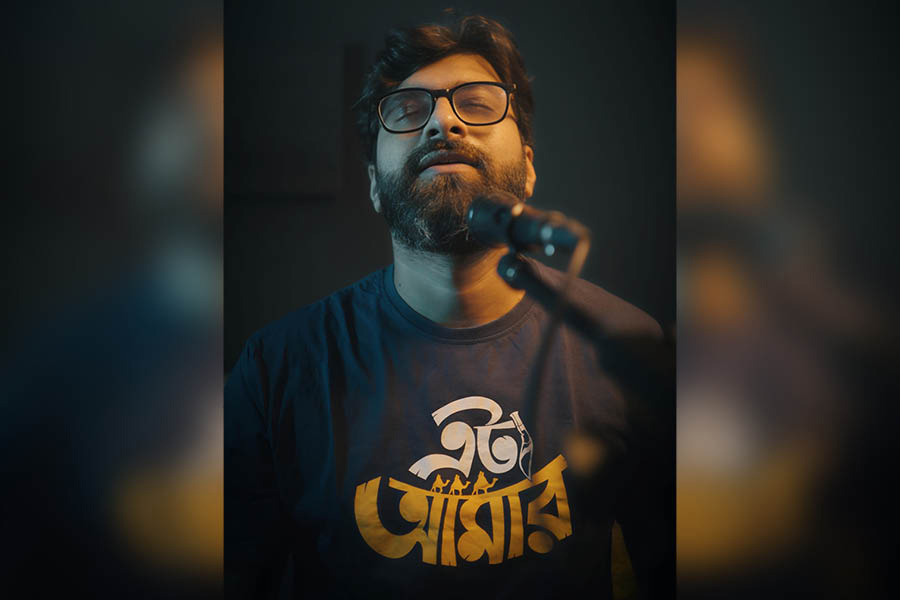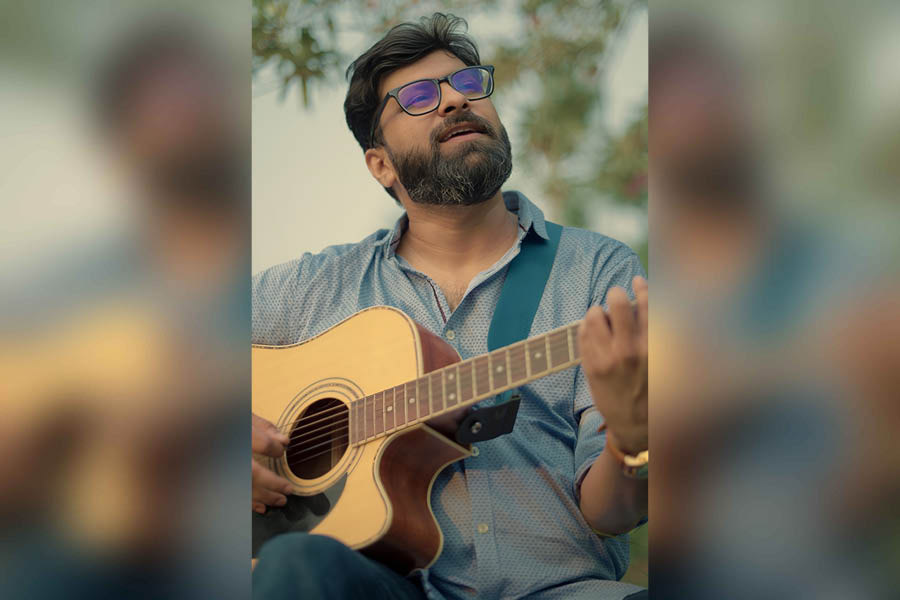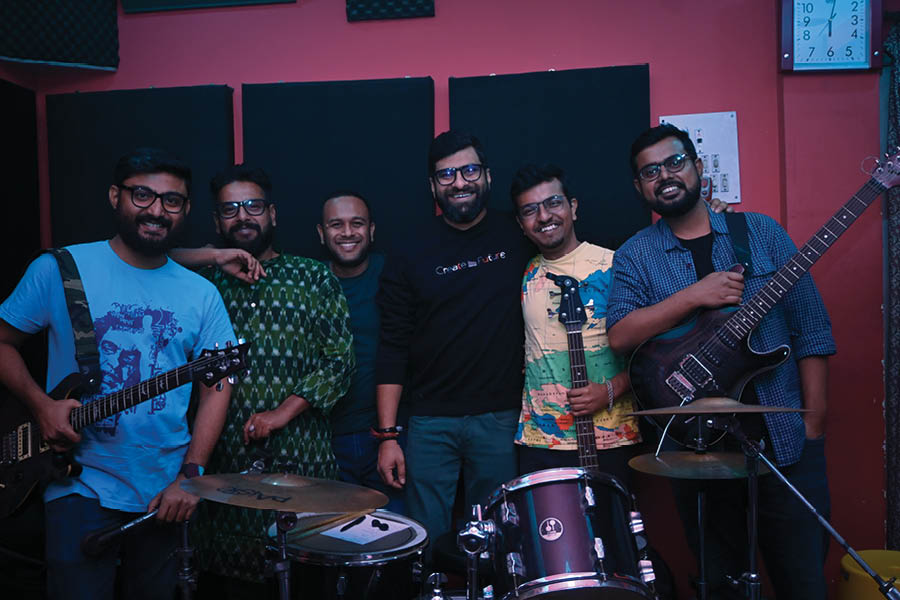“People like to see original music, not listen to it.” Debayan Das holds a faint smile for a few seconds before unpacking his comment. The lead vocalist for Obokaash, a band of IT professionals who turn into musicians over weekends, is speaking to My Kolkata at City Centre, Salt Lake, about his first solo album, Dugga Pujor Age, which is presently streaming on Spotify, YouTube and other mainstream music platforms. “Whenever there’s a new song by an independent artiste, most of us want to consume it as a story, not just as a song. Early feedback for my songs is often a look of people asking: ‘When will this go up on YouTube?’This means it’s not enough to mix and record and upload, you have to shoot a proper video, too,” explains Debayan, whose title track is the only one (of seven songs) that he shot.
New tracks are uploaded on Spotify every 1.4 seconds (according to data released in 2021), which has a digital library of more than 100 million songs. Some estimates suggest that the collection is even larger on YouTube, but there is a catch — songs on YouTube are more “seen than heard”, to quote Debayan. “We’ve entered such an overwhelming visual culture that anything that is new has to have a visual component,” feels Debayan, who differentiates between listeners streaming a fresh Taylor Swift album on loop on Spotify and getting bored with discovering unheralded artistes in the absence of visual engagement on the same app.
From the ‘deeply metaphorical’ Medusa to the ‘urban romanticism’ of Borshar Gaan
For Dugga Pujor Age, Debayan tried to strike a balance, hoping that the music video for the title track catalyses streams for the rest of the album. A sort of cross-platform pollination. “We shot the entire video for the title song in a single day. Shooting is expensive, you have to hire a cast, a cinematographer, camera and make-up personnel, and a small logistics team,” describes Debayan, who had to constantly switch between the roles of singer, male lead, chauffeur and logistics coordinator for the shoot. “For the sequence we shot on College Street, there was no parking. I had to walk for a few kilometres to reach my car. Then, we went to Maidan, and the rain had reduced most of the shooting spot to a pool of mud. But we had to manage. We also had Prinsep Ghat on the shot list, but decided to get rid of it. I was exhausted.”
For all the effort he put into his title track, Debayan is more attached to another song in the album. “Medusa was the first song I wrote for what eventually became an album. There’s a lot of rock in it, but it’s also a deeply metaphorical song. As a character, Medusa has a bad rep, so to speak. She’s generally portrayed as an antagonist, a hideous figure who couldn’t be looked at for fear of being turned into a stone. But what about her perspective? How must it feel for her knowing that nobody wants to look at her? That she remains perpetually unseen,” wonders Debayan. Medusa is one of two songs written by Debayan himself (the other being the title track). The rest are penned by Prosenjit Chowdhury, the lyricist for Obokaash.
“Prosenjit brings a certain gravitas to his songs, which invariably have political and social commentary. Khyapar Panchali and Brojer Rakhal (from the album) are good examples,” notes Debayan, identifying two tracks that are replete with satire. But they never get overly sombre, retaining the light touch of an album that does not want to pontificate. Romance and rumination are also a key part of the album, through the “urban romanticism” of Borshar Gaan and a “rural love story” in Bandhiya Rakhibo Tore.
Towards the end of the two and a half months it took Debayan to get the album ready, Kolkata witnessed the beginning of the RG Kar protests, which has fuelled many artistes to create an anthem or soundscape for the movement. “All my songs were ready by the time the protests started. I’ve released separate songs about the movement, but I didn’t want to tamper with the essence of this album,” says Debayan, who nonetheless identifies College Street as a song with its own pulse of protest, its own undercurrent of dissent against social ills.
‘The numbers don’t matter, the emotions do’

Debayan feels that marketing a song through influencers or on social media doesn’t pay much dividend for independent singers Courtesy Debayan Das
The challenges of launching a solo album don’t end with its release. If anything, that’s when the hardest part begins. “The part about getting people to listen,” laughs Debayan. For an independent musician, with no backing from a major studio or music label, the marketing and promotion also needs to be done independently. In other words, all by oneself. “One of the routes I’ve tried exploring is speaking to content creators and influencers to help get more traction. But it’s a segment that’s heavily monetised. Influencers who have around 10,000 to 15,000 followers on Instagram charge anywhere around Rs 5,000 to Rs 7,000 for a reel (of under a minute). The ones with more following are obviously costlier, you can’t even get in touch with them without going through an agency.”
What about uploading snippets of original compositions on social media? “I’ve tried that, too. But the problem there is with copyright. If someone steals your snippet and then it goes viral, there’s not much you can do (unless you have registered the song previously, not something most independent musicians do). There’s also the question of which section to choose and how to represent it without adequate context, since these are not cover songs that everyone knows,” responds Debayan, resigned to the fact that optimal traction, let alone revenue generation, cannot be the objective of a solo album for an independent musician.
For Debayan, a solo album is “about creating a slightly different soundscape, about producing something different as an artiste”. He continues: “With Obokaash, we’re working on a full-fledged folk album (expected to release in December). But in my personal capacity, I want to release more songs, maybe about 12 a year. Songs that touch people even if they don’t make me money.” With Dugga Pujor Age, some friends and family of Debayan who stay outside Kolkata heard the song and said it made them cry: “It made them miss Kolkata during Durga Puja. It’s something I’ve felt strongly about when I was a probashi. And that, for me, is what my music is all about. Making others feel things I have felt. The numbers don’t matter, the emotions do.”


